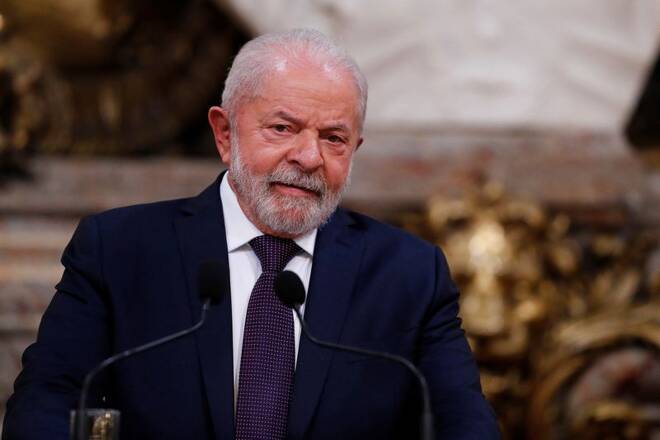Advertisement
Advertisement
Analysis-Lula confronts Brazil military’s pro-Bolsonaro lean with carrot and stick
By:
By Anthony Boadle BRASILIA (Reuters) - President Luiz Inacio Lula da Silva has taken a carrot-and-stick approach to asserting authority over Brazil's armed forces and containing sympathies in the barracks for his predecessor after violent unrest in the capital this month.
By Anthony Boadle
BRASILIA (Reuters) – President Luiz Inacio Lula da Silva has taken a carrot-and-stick approach to asserting authority over Brazil’s armed forces and containing sympathies in the barracks for his predecessor after violent unrest in the capital this month.
On Saturday, Lula fired the army commander for not following his government’s orders to dismantle a tent city of Bolsonaro supporters who clamored for a military coup and stormed government buildings on Jan. 8, a government source said.
Lula replaced the commander with another army general who days earlier was seen in a video on social media haranguing his troops on the need to respect the result of the October election in which the leftist Lula narrowly defeated far-right incumbent Jair Bolsonaro.
In a televised interview last week, Lula said he was convinced that parts of the armed forces were complicit in the storming of Brasilia, the worst attack on Brazil’s seats of power since the end of a 21-year military dictatorship in 1985.
“I thought it was the beginning of a coup d’état. I even had the impression that people were following the guidance that Bolsonaro had given them for a long time,” Lula said.
Lula vowed to bring to justice anyone involved, civilian or military, as demanded by his Workers Party.
But at a Friday meeting the commanders of the armed forces, Lula did not bring up the attack, according to a government official who witnessed the meeting.
Instead, he focused on the resources the military says it needs to defend Latin America’s largest nation, bringing industry leaders to the meeting to discuss investments in hardware and manufacturing, according to a defense ministry statement.
Lula’s focus on industrial development and generous spending to win over skeptics in uniform echoed his 2003-2010 presidency, highlighting his readiness to build bridges with military brass even as fellow leftists call for him to clean house.
The armed forces’ strategic plans to modernize its equipment included developing a nuclear-powered submarine contracted with France’s Naval Group, a subsidiary of defense contractor Thales.
Defense expert and former foreign policy congressional staffer Pepe Rezende said Brazil’s Navy is looking for additional frigates built with German technology by a joint venture between ThyssenKrup AG and Brazil’s Embraer SA.
The Air Force wants to buy 26 more Gripen fighters from Saab AB to be built in Brazil via technology transfer, and funds to complete the development of the MTC-300 cruise missile, the Brazilian Tomahawk missile with a range of 300 kilometers, that has an artillery version for the army, Rezende said.
The army is looking to buy drones and auto-propelled cannons. Above all, it wants armored vehicles to replace the 50-year-old Cascavel, and is in talks with Italy’s Iveco-Oto Melara Consortium, which is 50% owned by Leonardo, he said.
Genie out of the bottle
Whether a splurge on military hardware will help tamp down pro-Bolsonaro sentiment in the armed forces is open to question.
Lula has asked the commanders to rid the barracks of politics, the source with knowledge of the matter told Reuters.
Defense experts and political risk analysts say that cannot be done overnight after four years in which military officers gained prominence and wages in government posts under Bolsonaro.
The demonstrators clamoring for a coup outside the army headquarters in Brasilia included families of military officers with government jobs.
Oliver Stuenkel, at the Getulio Vargas Foundation think tank in Sao Paulo, told Reuters that Lula had to replace the army commander after media reports of his insubordination, out of political necessity, because he is facing public pressure to do something about pro-Bolsonaro sympathies in the military.
“The government is not willing to do more than that to remove anti-democratic elements from the military and go after the many skeletons in the armed forces closet,” Stuenkel said.
Brazil’s military dictatorship handed power to civilian government in 1985, but individual officers were never brought to trial for human rights abuses as in Argentina and Chile, so the armed forces still feel they have a say in the running the country, Stuenkel added. Reforming this relationship would take time and effort that would distract from Lula’s main objective of reducing poverty and inequality, he said.
“Lula wants this to go away as soon as possible,” he added. “Starting to punish members of the armed forces for what happened may be legally the right thing to do but politically it would open a Pandora’s box.”
Defense Minister Jose Mucio, a conservative politician whose appointment was well received by the armed forces, has sought to dissuade Lula from harsh steps antagonizing the military, said Paulo Kramer, a University of Brasilia professor that studies the army.
But distrust of Lula’s Workers Party has become ingrained in a military force still trained in Cold War national security doctrines, said Andre Cesar at Hold Assessoria Legislativa consultancy.
“It is impossible to put the genie back in the bottle, because relations between the military and a left-wing government will always be strained,” he said.
(Reporting by Anthony Boadle and Lisandra Paraguassu)
About the Author
Reuterscontributor
Reuters, the news and media division of Thomson Reuters, is the world’s largest international multimedia news provider reaching more than one billion people every day. Reuters provides trusted business, financial, national, and international news to professionals via Thomson Reuters desktops, the world's media organizations, and directly to consumers at Reuters.com and via Reuters TV. Learn more about Thomson Reuters products:
Advertisement
